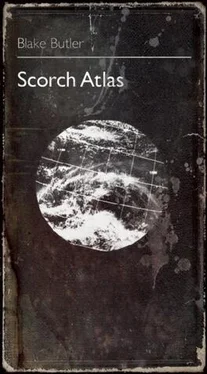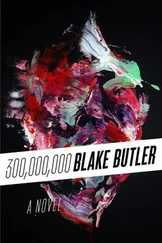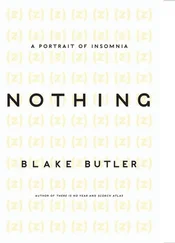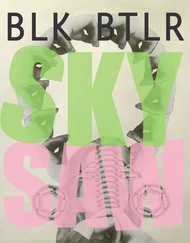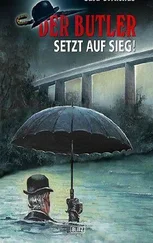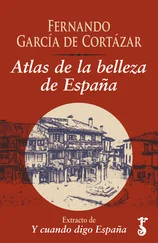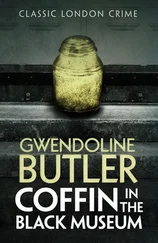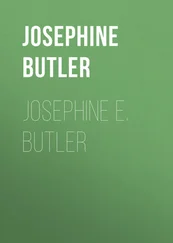This time when her hand hit his, he held it. It felt like his son’s once, during those few months he’d had a chance to feel — the palm pudgy and dampened, the fingers fragile, warm.
With the child, he turned around to face the forest, from the bird sound, from the sun.
They’d been walking for a week then. When the girl felt faint or winded, Randall would hoist her up. He didn’t like to stop for very long for any reason. He didn’t know where they were going, though he knew there had to be somewhere else from where they were — miles from any other city, miles from where they’d come.
In the blanched road they crossed dog carcasses wearing tags engraved with phone numbers, family names. Craters lined with white mud. Burnholes in the earth. The birds that had followed in fat flocks for the first few days had by now fallen from the sky, or disseminated after other things.
Randall let the girl eat leaves and roots and soft paper and anything preserved or clean enough. He had her chew her hair and nails for protein. When she asked what he would eat, he rubbed his gut. “So much saved up I could go forever,” he’d say in smile, though he knew if they didn’t find good food and water soon, they would wither, slump, and die.
They continued on together in a straight line beneath the scratched lid of the sky. The sun stayed stuck ahead unblinking. It did not wax or wane or become obscured by clouds or disappear for night. The surplus glow affected Randall’s vision. The ground and air lightened several shades. Slim spheres of heat moved in his margin — gaudy, blistered blobs of nothing. Inside his head he saw slow color, melted, morphed, and neon-blinked. Sometimes the colors formed his son — two blistered eyes behind his own eyes. His brain burped and gobbled, wriggling.
He could hardly think of what had been. He said his name over and over under horse breath to keep his mouth shape from forgetting, but soon even those familiar syllables went marred. His skin began to feel taut and made of leather. It peeled in layers. Itched his blood.
He tried to make the girl stay wrapped in a tarp torn from a camper, but she kept letting it slide off — she wanted to see where they were going, though she seemed to know he didn’t know.
When they weren’t talking, which was mostly, she hummed in glitches, cuts of hymn he’d never heard. She’d insist he hold her hand.
They crossed expressways with concrete cracking, large gaps woke in the median where the cars had skidded off, their windows sweltered obscure with condensation, airbags deployed and flaccid, popped. Smoke and ash hung on the air in streamered fuzz. They passed long fields where all the grass had died and ruptured black. Where there’d been forests once the trees had fallen over rotten and turned half to mush against the ground, the dirt riddled infertile with threadworms and microbes, small creatures burrowing spored homes. Drainage ditches gathered backed up with yellowed foam that didn’t give when it was kicked, though the stench was almost liquid.
Sometimes the sky would open up. Storms would appear out of nowhere, without thunder or a cloud. The only thing that didn’t rain was water. Lather. Crickets. Lesions. Seed. Sand drenched in thin torrential pillars, poured from above by erupted hourglasses. Blades of grass came whipped by wind and sliced the thin skin of Randall’s wrecked head. Peapods, pine straw, even plastic — sometimes they had to dig themselves out of what’d come down. Worse were the insects — gnat, mosquito, aphid — wriggling at their eyes. They picked the shit out of one another’s hair.
They hid under bridges or in carports that’d been abandoned. They made lean-tos out of rotten saplings, formed pillows from dead leaves. Often within minutes the girl snoozed soundly no matter what surrounded, her small head humming; Randall only ever tossed. He ripped his hair out in fat folds and threw up. He felt birds rutting in his stomach. His brain fizzled, swelling out.
He figured the sooner he did not remember, the sooner he would sleep.
The girl kept singing, making noise. She didn’t seem to notice what they’d come through. She announced what she’d be when she grew older. An astronaut, she said. A breadmaker. Randall often could not catch his breath.
They saw ruin and rocks and shit and stinging in long plates of earth congealed.
They saw whole buildings made to dander — where there’d once been people, now burned black and shrunken.
Sometimes Randall convinced himself they’d fallen into a repeating circle — a long whirred loop they’d never leave — every inch around them lurched the same, what with the stagnant sun ruining all bearing and the anthills. He didn’t try to understand.
They moved across the state, its borders pummeled, the land flattened out, awaiting flood.
They uncovered liquid cupped in gutters and strained it through his shirt and drank.
The girl’s skin turned soft and pasty. It snowed off her back in flakes. Randall stayed thankful they didn’t have a mirror.
They came upon the coast.
Even there standing on the bleached sand, Randall stood and sucked his tongue. He couldn’t imagine they’d made it that far. He hadn’t seen the beach since he went once as a child, afraid to step on the sand for fear of the clam holes, that they’d come up and rip into his feet.
Now they found the water missing. Where once there’d been multitudes half-naked, bathing, sunbathing, the shore was swarmed with dragonflies. Their blue bodies hovered, buzzing, looking for further things that’d died: they’d already stripped the meat off of the beached trout, the scales of salmon husked off, glinting light.
The sand cracked beneath their feet. The shore sat scummed over and pile-driven down, pale combs of foam dried at the farthest point where water’d lapped. Cracked shells of land-stuck jellies and uncased conch flesh sat overcooking, dried out, picked apart. Whole gulls with their skulls pecked in and post-ravaged by sand mites and worms.
The sun had drunk the ocean.
The sun more rapt than ever overhead.
Randall’s eyes could not keep their focus as the girl picked ahead among the wreckage. She fished sand dollars out of murk pools. She giggled, gaffed, hummed la-la-la. Tucked in the half-smashed ruins of some sand palace, she found a transistor buried up to its antennae. She dug it out and cleaned the speaker. She wiped the corroded batteries and licked the dials white, straightened the wires with her teeth. Soon she had the half-ruined thing alive, burping static broken by occasional squeals of incoming sound.
She skittered between the stations, searching to match the song set in her head. Randall didn’t have the heart to tell her it was useless, that nothing clear would come through now — how all those cryptic wavelengths once transmitting now were just more radiation. It made her happy just the same.
With nowhere else to go and under such stench, they continued on along the seabed. They walked out where before the water had been, the stretch of crunching sand endless for miles. Randall shuddered as they passed close to where once the tides would have lapped over their heads — for years in sleep he’d found himself stranded in such black; the miles and miles of unknown depth culling him under, full of grime.
They saw the dead all fuzzed and sunning. Whole fish schools. A swollen porpoise. Schools of jellyfish beat to vaseline. The seaweed knotted in fat brown scalps and punched with rash.
In small landlocked pockets they found tiny lidless fish clustered in barnacles and eaten through by mites.
Further out, there came another kind of wreckage: moored boats and ocean liners, rotting and picked apart by weather. Men’s skins lifted from their bodies. The whitewashed limbs of enormous swimming things held encrusted in the matted sand.
Читать дальше
